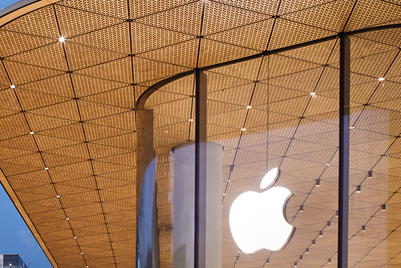
Mobile payments have become ubiquitous in China, but the market has been dominated by the domestic services Alipay and WeChat Pay. Apple is trying to change this by leveraging its relatively small, but affluent Chinese user base and enticing them to use its own service, Apple Pay, with big discounts at major retailers[link in Chinese]. While the push has a clear focus on offline purchases, online retailers and online travel booking websites were also included in the promotion.
From July 18 to 24, Apple Pay users could receive discounts of up to 50 percent and discounts could be received up to 50 times. Offline retailers in the promotion included: 7-Eleven, Burger King, Carrefour, Costa Coffee, Gap, Godiva, Lawson, Pizza Hut, Starbucks, and many other domestic firms.
Just as Alipay and WeChat Pay have attempted to cash in on the rapidly growing Chinese travel market, Apple Pay is also finally making a push. During the promotion period, users could receive discounts booking tours, hotels, or plane tickets through eLong, Ctrip, Qunar, and Wanzhoumo. Online organic food retailers Chunbo and Benlai were included, along with major online entertainment ticket sales platforms Maoyan Dianying, Weipiao, and Gewara.
Major online retailers like JD.com, Kaola.com, and Yoho!Buy also took part.
Alipay and WeChat Pay have shares of China’s mobile payment market of 55 percent and 40 percent respectively, and are currently engaged in a global battle to capture the Chinese outbound tourism market by facilitating easy, cashless payments abroad.
Apple Pay launched in China in February last year.
Apple’s attempts to popularize Apple Pay amongst Chinese users have thus far been somewhat anemic. This is despite Apple holding a substantial share of the Chinese smartphone market. Apple has a market share of 9.6 percent, although this is declining quite quickly. Much of that can be attributed to more and more lower income Chinese buying their first smartphones, which has greatly benefitted firms with budget smartphone offerings like Huawei and Oppo.
Apple phones are significantly more expensive in China than the US and average incomes in China are much lower, meaning the potential market for the iPhone in China is relatively smaller than in the US or Europe.
But this number belies the purchasing power of Apple’s “small” user base. Apple’s user base in China is almost entirely made up of relatively affluent individuals and encouraging online and brick and mortar purchases through Apple Pay could prove quite lucrative for the Cupertino firm.
The partners in Apple’s recent promotional discount campaign reflect this affluent focus. JD.com, for example, has heavily marketed its e-commerce platform to affluent Chinese looking to buy Western luxury fashion goods. Starbucks, while relatively standard in the US, is still somewhat of a luxury brand in China. Wanzhoumo is a firm that offers more upmarket, high-quality weekend getaway tour packages and targets more discerning, high-income Chinese travelers.
These efforts could also help Apple take advantage of the large number of affluent Chinese going to Europe or North America, where Apple Pay is already well-established and more widely used. In this sense, WeChat Pay and Alipay are at a distinct disadvantage. However, this gap is quickly being closed as the two Chinese firms expand their European and American partnerships.



.jpg&h=334&w=500&q=100&v=20250320&c=1)



.png&h=334&w=500&q=100&v=20250320&c=1)
.png&h=334&w=500&q=100&v=20250320&c=1)
.png&h=334&w=500&q=100&v=20250320&c=1)

.png&h=334&w=500&q=100&v=20250320&c=1)


+(900+x+600+px)+(2).jpg&h=268&w=401&q=100&v=20250320&c=1)



.png&h=268&w=401&q=100&v=20250320&c=1)

